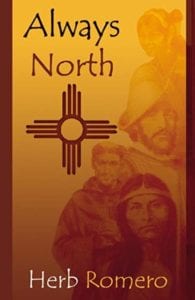
About the Book:
Always North is a sequel to The Adventurers; a saga of a Spanish family intertwined historically with USA beginnings. In 1598, King Phillip II directs resettlement of families from New Spain to a remote northern region that in 1848 would become the American southwest. Spaniard settlers suffer from harsh conditions as young and old keep dying from unknown diseases, while others are killed by raiding Indian marauders. For the first two hundred years, Spaniards follow royal laws of New Spain until 1821 when that dominion is overthrown by a Creole rebellion and Spaniard colonists come under temporary Mexican rule.
Read an Excerpt:
Featured in Dec/Jan 2017 Issue: 2016 Best Indie Book Competition Winners
In Always North you will learn, that because of plain ignorance by early 19th century governmental leaders, a factual part of America’s history continues to be denied from being taught in schools. And as we move on with our lives in this 21st century, our children are still deprived of an important part of American history. Reviewed as a five star eye opener, this book contains information from documented sources, and from stories handed down from family to family through the generations. It is a story of my ancestors, who as part of a group of Spaniards in 1598 established the very first permanent European settlement in present day United States. Three centuries later, we would know this region as the American southwest.
Because of foreign infringement rumors into remote parts of his Kingdom, Spain’s King Phillip II directs resettlement of families from New Spain to a northern region; an area, Coronado had originally recorded as favorable in 1540.
Life proves harsh for the colonists. For the first two hundred years, they follow laws of New Spain until that Dominion is overthrown by a peasantry coalition revolt later known as Mexicans. And unknown to settlers because of an antiquated communication system, several months go by before Kingdom settlements find they are now under Mexican rule that lasts twenty five years.
As a fledgling government with internal growing problems, Mexicans ignore non-threatening settlers in their far isolated region, except for annual visits to take a census and collect taxes. Then after winning the American-Mexican war in1848, the United States inherits the vast number of original Spanish territories. Now confronted with a large number of Spaniards who seem to speak a language similar to those they just defeated, congress in Washington question “the loyalty of this new class of colored people.”
For the next thirty years, American congressmen continue to vacillate. Spaniards are referred to as Mexicans by new eastern immigrants, and Spanish parents continue begging for their archaic Spanish speaking children to be educated in the new English language. My father was ten years old before seeing his first American book.
